Prayer prompts (and responses) now have typing indicators. From Bible-based chatbots to ones that simulate conversations with religious leaders or gods of various faiths, a new wave are being launched into time and space by both for-profit companies and earnest nonprofits trying to save souls.There has been astonishing success — stories among hardware developers and credit card marketers about the ways in which small-group pastors have turned their fellowship-recruitment over to the bots.
A recent trend piece in The New York Times detailed how faith-forward tools are gaining traction on the mainstream market. Bible Chat has been downloaded more than 30 million times, and Hallow was at one point the top grossing app on Apple’s App Store last year, suggesting that spiritual chat is not a fringe experiment but a consumer phenomenon.

Why People Ask A.I. to Solve the ‘Mind-Body Problem’
Convenience, privacy and around-the-clock availability are luring seekers to AI. For those who would hesitate to ask a pastor, rabbi or imam sensitive questions in private can experiment with ideas in an unjudging chat window. For others — shift workers, caregivers, students — an on-demand companion fills in gaps between weekly services or infrequent counseling.
There’s also a demographic undertow. For the first time, a Gallup poll has found that fewer than 50 percent of Americans feel connected to a religious institution, while interest in making meaning and engaging with ritual remains robust. Pew Research Center has also registered a steady increase in the number of American adults who report attending a religious service online or via videoconference throughout the pandemic. Bluntly: spiritual curiosity hasn’t gone away, but the places to pursue it are shifting.
Inside the New Spiritual Chat Room on Clubhouse
Most faith chatbots claim to base responses on scripture and tradition. Hallow mixes guided prayer with reflections aided by artificial intelligence. Bible Chat asks users to input contextual questions — grief, forgiveness, purpose — and spits back verse cites plus explanations. Apps like Text With Jesus, in which individuals can “message” biblical figures, and web endeavors such as QuranGPT or GitaGPT, which provide Q&A based on Islamic and Hindu texts, respectively, compete in some corners.
Some go even further, alleging that connection to the divine voice was direct. That premise is captivating—and controversial. Developers sometimes tack on disclaimers, but the design choice erases a line that religious leaders have typically protected with mentorship, study and discernment.
Promise Meets Peril
Used well, AI can reduce the barriers to belief for those open to it. Rabbi Jonathan Roman has made the case that conversational tools can be an entry ramp for those who have never walked into a sanctuary, offering as their first low-stakes engagement with faith language and practice.
But the risks are real. Big language models are also known to echo a user’s prejudices — a phenomenon that AI labs have called “sycophancy.” That inclination can console, but it can also ensnare people in their own worldview. Heidi Campbell, a Texas A&M scholar of digital religion, warns that the systems are patterned to reflect trends in data, not make spiritual judgments. They don’t need to act smart while mostly just reflecting us.

Another dilemma is when sacred texts are hallucinated—confident but incorrect utterances.
Misquoted verses or mashed-together doctrines can lead rookies astray. And in the absence of clear crisis protocols, a bot could mishandle pleas for pastoral care around trauma, abuse or self-harm, all cases where trained human assistance is crucial.
What Responsible Design Is
Experts cited a few guardrails. First, transparency: disclose the theological lens (Catholic, Sunni, Reform, non-denominational) through which you trained. Second, citations as a default: let there be shown verse references, commentaries or catechism articles so that the users can verify claims. And third, humility: Bake in friction for sensitive topics — grief, suicide, medical concerns — with clear handoffs to clergy, counselors or hotlines.
The best apps are starting to follow the lead of these conventions. Some limit their “voice of God” personas, portraying the AI as a homework buddy instead. Others present denomination specific editions or route tricky questions to human moderators. The more promising experiences combine AI’s immediacy with community: journaling prompts, local congregation finders and reminders to bring questions to a trusted leader.
Clergy, Not Replaced—Reframed
Chatbots, many in the faith community say, are increasingly conversation starters rather than replacements. Pastors say parishioners are coming to church armed with machine-written handouts that inspire them to conduct further research. Rabbis are deploying bots to highlight relevant commentaries in their classes. Imams point out the attraction of anonymous Q&A for converts exploring early practice. In every instance, the human guides offer what machines cannot: lived wisdom, accountability and communal belonging.
So the measure of success isn’t whether a chatbot gives an answer.”Instead, it’s whether the “chat intervenes in a way that nudges the seeker toward trust-worthy people and sources, life giving practices, and real relationships. When it does, the tradition is the servant of the tool. When it doesn’t, there is a risk that it will turn faith into an echo chamber with a smiley face.
The Bottom Line
“Spiritual chatbots are here to stay, driven by consumer demand and fast-evolving AI.” They may be able widen the door to faith for the curious and uncertain. But the soul demands more than pleasant algorithms. The future, though, will be to apps that combine reverence with rigor — and know when to give up the floor to a human voice.

